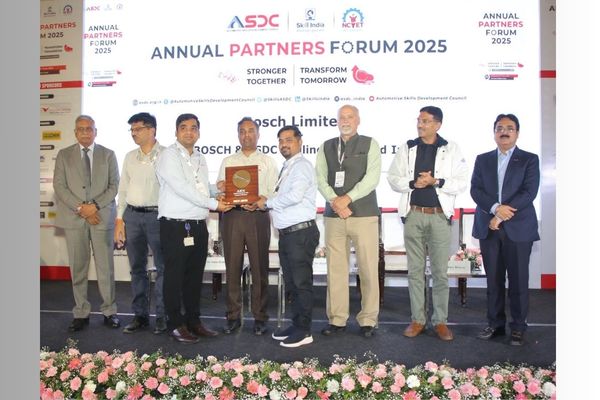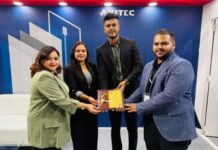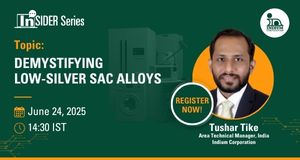Automotive Skills Development Council (ASDC) successfully hosted its Annual Partners Forum 2025 at The Grand Hotel, New Delhi, bringing together over 250 leading industry stakeholders, government representatives, and academic leaders. This year’s theme, “Stronger Together, Transform Tomorrow,” underscored the urgent need for collaborative action to shape the future of India’s dynamic automotive industry.
The event was inaugurated by Dr. Hanif Qureshi, Additional Secretary, Ministry of Heavy Industries; Prof. T.G. Sitharam, Chairman, AICTE; and Dr. Rodney Riviere, Cluster Coordinator, GIZ India, as Guest of Honour. Also present was Dr. Suhas Deshmukh, Director, NCVET, as Special Guest.
In his keynote address, Dr. Qureshi highlighted the significant role of the automotive industry in India, contributing over $240 billion to the economy and accounting for 42% of manufacturing output.
He said, “Under the visionary leadership of Hon’ble Prime Minister Shri Narendra Modi, the government is committed to building a resilient, future-ready sector with a goal of achieving net zero emissions by 2070. The ₹26,000 crore PLI scheme is driving innovation in electric and hydrogen mobility, with over 12 companies already meeting the 50% domestic value addition benchmark—marking a strong push toward indigenization.” Emphasizing the growing demand for a skilled automotive workforce, Dr. Qureshi added, “Skilling initiatives are vital to align with global manufacturing timelines and to boost India’s current 3% share in the $700 billion global auto components market. While ASDC’s efforts in automotive skilling are commendable, there is an urgent need to skill and reskill in emerging domains to bridge the talent gap and prepare for a larger role in next-generation technologies.”
Prof. T.G. Sitharam, Chairman, AICTE, said, “This is indeed a golden period—what the Hon’ble Prime Minister calls the ‘Amrit Kaal’. It’s the right time to build globally competitive, innovation-led products for Viksit Bharat 2047. Skilling participation must rise, especially in robotics and emerging technologies. I commend ASDC for its vital role in preparing a future-ready workforce aligned with industry needs, powering India’s global leadership in automotive and EV sectors.”
Dr. Suhas Deshmukh, Director, NCVET, in his remarks, spoke about the transformative potential of National Education Policy (NEP) 2020, especially in making technical education more inclusive and industry-integrated. “We are committed to embedding hands-on skilling, flexibility, and multidisciplinary learning across institutions to ensure our youth are both job-ready and future-proof,” he noted.
Mr. F. R. Singhvi, President, ASDC, reiterated the forum’s importance: “This gathering reflects the synergy between government, industry, and academia in driving workforce transformation. ASDC is dedicated to preparing a workforce that can adapt to the challenges and opportunities of this decade.”
He further emphasized that beyond technical skills, it is essential to nurture students in areas such as human values, positive attitudes, communication skills, and a sense of responsibility toward their work. “We must aim to develop professionals who not only meet but exceed global standards in quality and performance. Only then can we shape future leaders and position India as a global leader in the automotive sector,” he added.
Echoing this vision, Dr. Rodney Riviere remarked, “AI won’t replace our mechanics, trainers, or engineers—it will augment them. It will accelerate training, enhance diagnostics, streamline logistics, and even personalize customer service. The future of our industry isn’t about man or machine—it’s about man and machine working together, like a driver in a high-performance car.”
The event featured several key moments, including the recognition of CSR partners, convocation ceremony of female candidates under Project Saksham supported by HeroMoto Corp, MoU signings between ASDC and HCL Foundation, Lucas Indian Services Ltd, Victora Foundation, and Hero MotoCorp Ltd – Haridwar, and two insightful panel discussions – “Classroom to Career: Reimagining Vocational Education under NEP” and “Unlocking Potential: Sustainable Livelihood Skilling through CSR.”
Sponsors for the event included George Telegraph & Vision India, ISIE India (Imperial Society of Innovative Engineers), and Ascensive Educare.
The forum concluded with a shared resolve to advance India’s skilling ecosystem and position the nation as a global hub for automotive talent. ASDC reaffirmed its commitment to developing innovative and inclusive skilling pathways for a thriving, future-ready India.

















